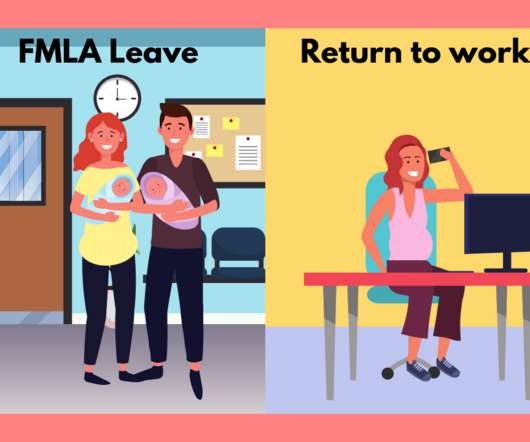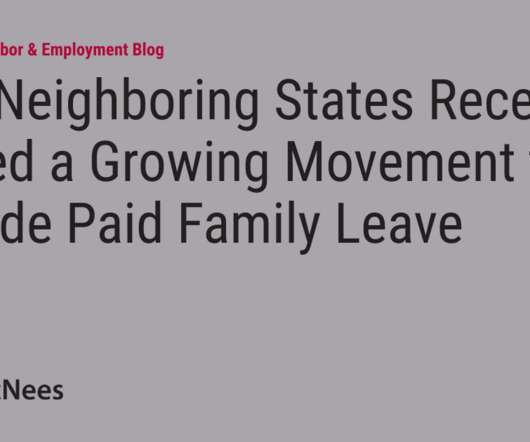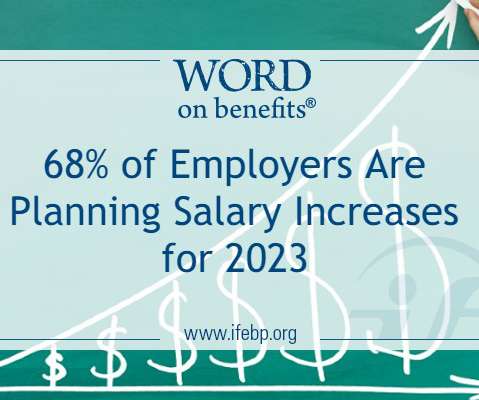Federal action is needed to fix paid leave patchwork
Employee Benefit News
NOVEMBER 2, 2023
State actions on paid leave regularly make it harder for employers to continue providing benefits that exceed the programs they created.
This site uses cookies to improve your experience. To help us insure we adhere to various privacy regulations, please select your country/region of residence. If you do not select a country, we will assume you are from the United States. Select your Cookie Settings or view our Privacy Policy and Terms of Use.
Cookies and similar technologies are used on this website for proper function of the website, for tracking performance analytics and for marketing purposes. We and some of our third-party providers may use cookie data for various purposes. Please review the cookie settings below and choose your preference.
Used for the proper function of the website
Used for monitoring website traffic and interactions
Cookies and similar technologies are used on this website for proper function of the website, for tracking performance analytics and for marketing purposes. We and some of our third-party providers may use cookie data for various purposes. Please review the cookie settings below and choose your preference.

Employee Benefit News
NOVEMBER 2, 2023
State actions on paid leave regularly make it harder for employers to continue providing benefits that exceed the programs they created.

PayrollOrg
MAY 2, 2023
Starting in 2024, Illinois employers will be required to provide employees with 40 hours of paid leave annually, for any reason.
This site is protected by reCAPTCHA and the Google Privacy Policy and Terms of Service apply.

PayrollOrg
APRIL 28, 2023
Starting in 2024, Illinois employers will be required to provide employees with 40 hours of paid leave annually, for any reason.

PayrollOrg
FEBRUARY 16, 2024
New York would be the first state in the nation to require employers to provide employees with paid leave for prenatal care, under a proposal from the governor.

HR Digest
DECEMBER 17, 2024
This way employees have a greater investment in ensuring the companys performance and they also benefit from their employers success. The post Starbucks Parental Leave Policy Doubles the Paid Leave for New Parents appeared first on The HR Digest.

Employee Benefit News
SEPTEMBER 8, 2022
(..)

Employee Benefit News
OCTOBER 10, 2024
Companies should consider offering paid leave for employees who are victims of domestic violence and other serious crimes.

McDermott Will & Emery Employee Benefits
APRIL 18, 2023
The Paid Leave for All Workers Act (PLAWA) was signed into law by Governor J.B. Pritzker on March 13, 2023, ensuring that all workers in Illinois receive 40 hours of paid time off annually for any purpose.

WEX Inc.
JUNE 25, 2024
Employers are increasingly recognizing the importance of providing ample time off to their employees with more than 80% of U.S. employers planning to change their leave policies over the next two years. Let’s take a look at some of the most recent trends regarding increased paid leave. The percentage of U.S.

McDermott Will & Emery Employee Benefits
DECEMBER 7, 2023
As of December 31, 2023, all employees physically working in Chicago for at least two hours in a two-week period will earn both one hour of paid leave and one hour of paid sick leave for every 35 hours worked, pursuant to an ordinance passed by the Chicago City Council on November 9, 2023.

Patriot Software
SEPTEMBER 7, 2022
As an employer, you may wonder why an employee would receive a paid leave of absence and how it will affect your business. It is your responsibility to understand the laws about leaves of absence.

Patriot Software
OCTOBER 23, 2023
Are you an Illinois employer? Do you provide paid time off (PTO) to your employees? Beginning in 2024, providing paid time off is no longer a choice—it’s a state mandate. In March 2023, Illinois Governor JB Pritzker signed SB208 into law, requiring Illinois paid leave.

BerniePortal
JULY 27, 2020
Department of Labor (DOL) recently released new Families First Coronavirus Response Act (FFCRA) return-to-work guidance for organizations to follow during the coronavirus pandemic, including paid leave requirements for covered employers through Dec. Here's what you need to know.

HR Bartender
FEBRUARY 27, 2018
This legislation is focused on two hot topics in our workplaces right now – paid leave and flexible work. A Little Background about Paid Leave. Nine states and over thirty localities have implemented some type of paid sick leave legislation over the past few years. It pre-empts state and local provisions.

HR Digest
MARCH 28, 2025
Are you wondering if your employer can ask for a doctors note for a work absence of just one day? Sick leave policies vary, and while some states limit when employers can request a doctors note, others leave it to employers requirements. A reader asks: Can an employer request a doctors note after an illness?

Patriot Software
APRIL 4, 2022
Nationwide COVID paid leave may have ended in September 2021, but Californians have another state-specific law to follow. Effective February 19, 2022, employers may need to provide California supplemental paid sick leave. California supplemental paid sick leave […] READ MORE.

Employee Benefits
JANUARY 13, 2022
Software company Quantilope has allowed all its employees worldwide to take unlimited paid leave. The firm said it had been focusing on flexible working hours , a high degree of personal responsibility in scheduling and trust between employer and employee since its formation.

Employee Benefits
SEPTEMBER 27, 2023
Employees who have obtained a Special Guardianship Order from a family court will be able to take 26 weeks’ kinship leave on full pay. The retailer introduced the kinship leave policy after employee Taylor Kershaw, who works in Tesco’s employer brand team, raised awareness of the issue after stepping in to become a guardian for her niece.

Vantage Circle
MARCH 25, 2025
But knowing that your employer offers an emergency savings fund can make a real difference. Eldercare support Whether it’s paid leave to care for a loved one or financial assistance for professional eldercare services, this benefit is a lifesaver. But where Netflix really stands out is parental leave.

Employee Benefits
MARCH 15, 2023
Need to know: The Neonatal Care (Leave and Pay) Bill will allow parents with babies needing neonatal care to take up to 12 weeks paid leave. The Employer with Heart charter is awarded to organisations that have extra provisions in place for employees with babies who are born prematurely.

Employee Benefits
JANUARY 30, 2024
All of its more than 850 employees now have access to its enhanced offering of up to five days of paid leave per year, regardless of how long they have been in their roles. The post 41% of employers have a dedicated carer’s leave policy appeared first on Employee Benefits.

HR Lineup
MAY 17, 2022
The great resignation is here and not going away anytime soon until employers evaluate their employees’ needs and find ways to retain them. The ongoing great resignation has left employers wondering how they could retain their existing talent. Employers should also consider investing in mental health care programs or resources.

Global People Strategist
NOVEMBER 20, 2023
India’s Labor Laws Indian labor laws are a tapestry of regulations that govern the employer-employee relationship. These laws encompass various aspects, including employment contracts, working conditions, and dispute resolution, all designed to ensure the rights of both workers and employers are upheld.

Patriot Software
APRIL 8, 2020
One of the coronavirus small business relief measures comes in the form of employer tax credits. There are two groups of refundable coronavirus tax credits available for employers: 1) COVID-19-related tax credits for paid leave and 2) Employee Retention Credit.

Employee Benefits
JUNE 20, 2023
Last month, Employee Benefits reported that the Neonatal Care (Leave and Pay) Act, which was introduced by Stuart C McDonald MP, received Royal Assent. This is in addition to maternity and paternity leave. It provides up to 12 weeks of fully paid leave to any UK employee whose baby requires specialist neonatal care.

BerniePortal
JUNE 7, 2021
Legislative responses to the COVID-19 pandemic introduced entirely new compliance requirements for small and mid-sized employers. And while many regulations helped keep team members on staff, many organizations can’t keep up with paid leave requirements and other employee assistance measures.

HR Lineup
MAY 24, 2022
VTO is a form of leave where employees get paid to go and volunteer in specific charity/community-based functions. Employers realized that volunteering programs improve employee engagement and corporate social responsibility. Therefore, many employers are nowadays incorporating it into their leave policies.

Employee Benefits
JANUARY 17, 2024
More than two-fifths (43%) of employers offer no additional support beyond time off for bereavement , according to research by bereavement support firm Empathy. The post 43% of employers do not offer bereavement support beyond time off appeared first on Employee Benefits.

International Foundation of Employee Benefit Plans
MARCH 14, 2024
Proposals for paid family and medical leave at the federal level historically haven’t had enough support to become law.

Global People Strategist
DECEMBER 12, 2023
Understanding local employment laws is crucial for those considering employment opportunities in this South American nation. Navigating the intricacies of Peru’s employment landscape involves grasping key aspects such as general labor laws, tax regulations, and employee benefits.

Best Money Moves
DECEMBER 9, 2024
Compared to years prior, employees are more interested in retirement benefits and paid leave opportunities. According to Mercers Survey on Health and Benefits Strategies for 2025, about two-thirds of large employers said that improving healthcare affordability is a priority for the next year.

Global People Strategist
DECEMBER 4, 2023
Labor Laws in Italy The labor laws in Italy are renowned for their complexity, reflecting a history of ongoing negotiations between labor unions and employers. Contract Types One distinctive feature of Italian labor laws is the variety of employment contracts available, each with its rules and requirements.

Money Talk
AUGUST 18, 2022
Leave may be uniform for all employees (e.g., Some employers allow workers to accumulate sick leave. Others take a “use it or lose it” approach where sick leave cannot be carried forward to future years. Paid Personal Days - This is a third type of fully taxable paid leave. Like vacation time.

International Foundation of Employee Benefit Plans
MAY 13, 2022
Read more > The post The Next Big Thing: How Employers Can Prepare appeared first on Word on Benefits. In early April, the International Foundation hosted the webcast Innovation and the Future of Remote/Hybrid Work. We were lucky enough to bring in Alex Willis, chief executive officer at Leadership.

WEX Inc.
FEBRUARY 12, 2025
elections potentially leading to significant shifts in employment laws and employee benefits, its crucial for employers to stay ahead of changes to maintain compliance. Employers who proactively monitor and adjust their benefits plans will be best equipped to meet these evolving compliance requirements. With the 2024 U.S.

Insperity
MARCH 25, 2021
If you’re considering entering into an agreement with a professional employer organization (PEO) , chances are you have questions about how PEO pricing works. What is your employer overhead? Employer overhead (in excess of compensation) typically costs between 1.25% and 1.4% of an employees’ salary, according to the U.S.

HR Lineup
MAY 28, 2024
Employee perks, also known as employee benefits or fringe benefits, are additional incentives provided by employers to their employees beyond their regular salaries or wages. Companies are offering: Parental Leave: Generous paid leave for new parents, including both maternity and paternity leave.

Patriot Software
MARCH 29, 2021
New York began offering coronavirus paid leave in response to the COVID-19 pandemic in 2020. The New York State Department of Labor (NYS DOL) updated and expanded New York COVID leave guidelines in January 2021. If you’re an employer in New York, read on to learn more about the state’s COVID leave expansion.

HR Digest
NOVEMBER 19, 2024
Employees and employers must be aware of all the rights and nuances that come under it. The employee has to have worked at the organization for at least 12 months, and have at least 1,250 hours of service with the employer before they apply for the leave. The post What Is the Family and Maternity Leave Act?

Business Management Daily
JULY 7, 2021
In this BusinessManagementDaily.com article, we cover FMLA return to work guidelines, including: Steps employers need to follow when employees are planning their return to work from FMLA leave. Tips for employees pertaining to leave laws, entitlement, and FMLA return to work guidelines. Equal job duties/working conditions.

Employee Benefits
JULY 16, 2024
Multinational telecommunications firm BT Group is to roll out a new family leave policy for its UK employees from 1 January 2025. The group’s new family leave policy is aimed at levelling up paid leave for any parent welcoming a new child. In addition, BT Group launched a carers leave policy last month.

McNees
MAY 25, 2022
Maryland and Delaware recently joined the growing list of states that have enacted legislation requiring employers to offer paid family and medical leave. Maryland’s new law will cover all employers with at least one employee in the state. Employers with 10 to 24 employees only need to offer parental leave.

Bayzat
DECEMBER 1, 2023
Understanding termination of employment processes in the UAE helps employers and workers foster healthy transition relationships. Under labour laws, responsibilities and liabilities fall on workers and employers terminating employment, and ignoring these can attract legal consequences. What is Termination of Employment?

International Foundation of Employee Benefit Plans
NOVEMBER 3, 2022
employers and found. Read more > The post 68% of Employers Are Planning Salary Increases for 2023 appeared first on Word on Benefits. Organizations are planning salary increases and closely examining their total rewards packages for the year ahead in response to changing workforce demands.
Expert insights. Personalized for you.
We have resent the email to
Are you sure you want to cancel your subscriptions?


Let's personalize your content